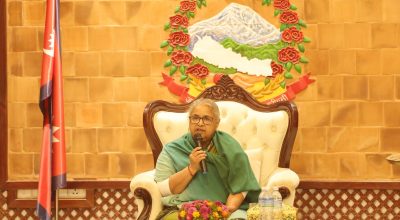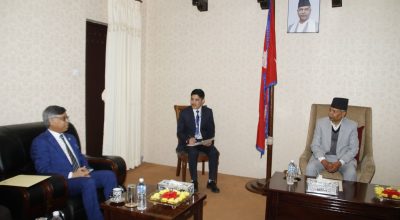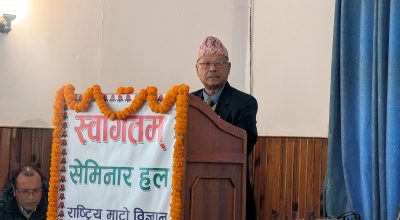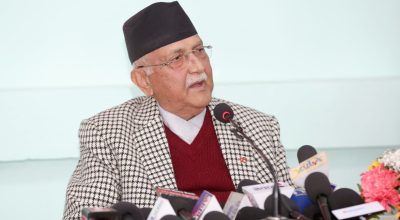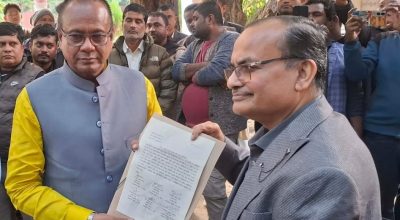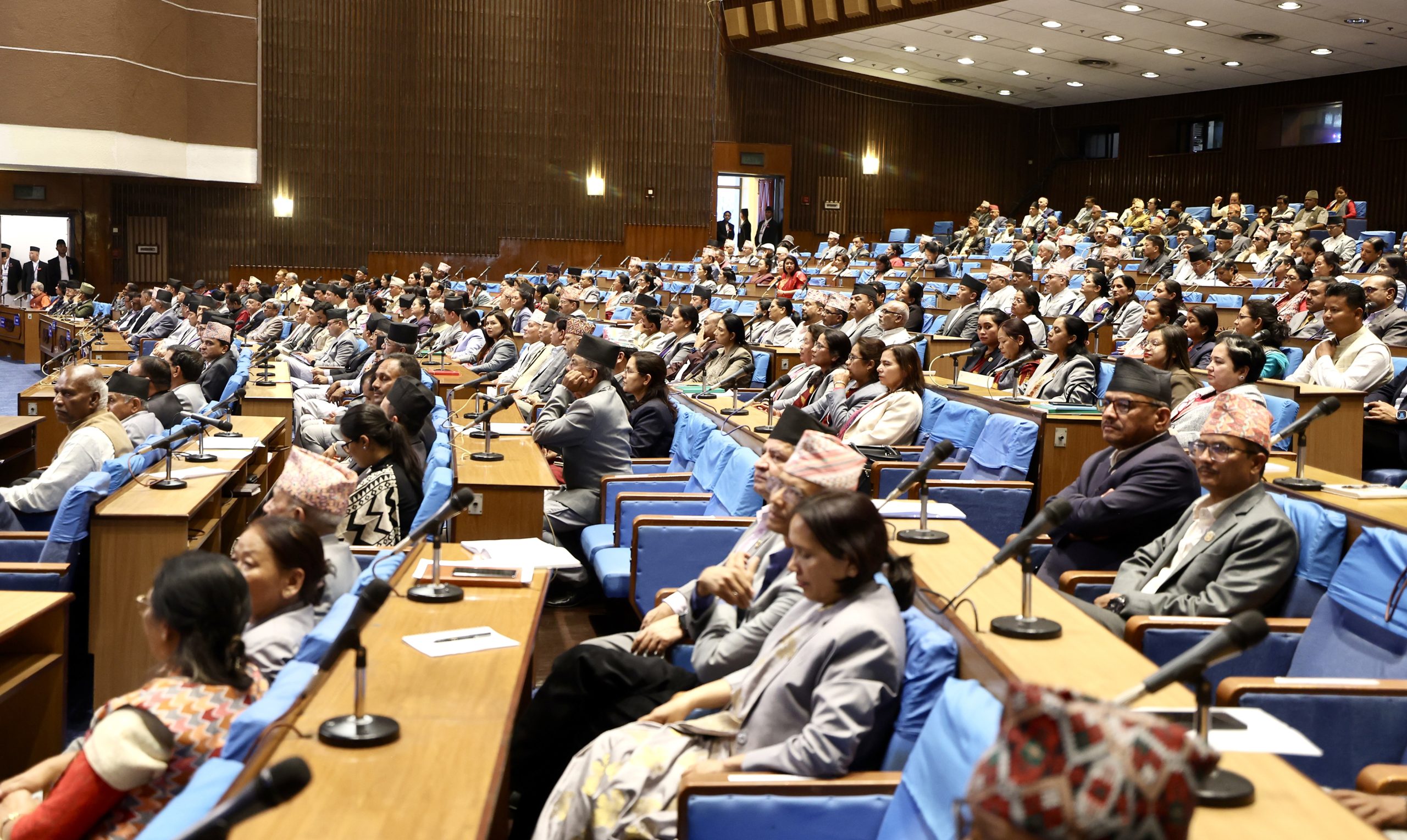
Kathmandu, May 14: 29. The government has said the procurement law will be reviewed to make the procurement system competitive, transparent and development-friendly.
In a policy and program unveiled in the Federal Parliament today, it has stated that institutional capacity of procurement units of public entities will be enhanced.
Likewise, Socio-economic benefit, provincial balance, production and employment generation will be considered primary criteria for selecting development projects. Only projects which are in ready-to-go stage and have assured returns will be selected. Sufficient budget will be allocated to the projects and programmes that are under implementation by reprioritizing them that ensure results and completion within the specified time.
A policy will be taken for continuation, postponement or cancellation of the project based on its progress.
Feasible projects that are being implemented but have not reached the expected level of progress will be carried out in the public-private partnership approach.
The monitoring and evaluation system of development programmes and projects will be made IT-based and result-oriented. Monitoring capacity of the District Coordination Committee will be enhanced to increase the effectiveness of local level development.
Public policy will be based on facts and evidence. National policy, standard and code of conduct relating to research and studies will be prepared. Capacity of related agencies will be enhanced by removing institutional duplication in policy making. Arrangements will be made for integrated archive and use of reports and results of studies and research in public sector. Standard of testing and validity of all types of study, research and innovation will be prepared.
Base year of National Accounts Estimates will be revised. The data and information generated by the three tiers of government will be made accessible by including them in the National Data Profile. Interoperability will be maintained between digital administrative records systems of public entities.
Partnership for Production and Employment
The current government has accorded top priority to production, productivity and employment growth. ‘Partnership for Production and Employment’ programme will be conducted in partnership with three tiers of government, private sector, cooperatives and community to increase domestic production, import substitution and enhance exports and generate largescale employment in the country. The programmes related to increase in production in different agencies will be implemented in an integrated manner on the basis of their complementarity.
A clear roadmap will be prepared and implemented for the production, productivity enhancement, modernization, commercialization and marketing of the agriculture sector. The action plan for agricultural ecosystem improvement from production to marketing will be implemented. An agricultural system based on land use will be developed by ensuring linkages between agriculture, livestock farming and forests. The decade commencing on fiscal year 2081/82 will be declared as the “Investment Decade in Agriculture” and the investment of public, private, cooperatives and development partners will be increased.
Agriculture
Agriculture sector programmes will be restructured with a view to make self-sufficient in major food grains and vegetables. Farmers will be ensured easy access to the means of production well before planting. The use of modern technology in agricultural production will be encouraged. Protection of arable land, barren land along the river-banks and reclaimed land will be utilized and land-pooled. Collective farming, contract farming and cooperative farming will be promoted by consolidating the fragmented agricultural lands. Food processing industry will be established in collaboration with private sector by developing commercial agriculture on arable land.
Special program will be conducted for self-sufficiency in seed production. Within the next fiscal year, all the local varieties of crops will be registered and the crops of high productive varieties will be promoted.
In-country production of raw materials necessary for agriculture and other industries will be encouraged. Arrangements will be made to provide agricultural loans easily to agriculture and agriculture-based industrialists. The reach and scope of insurance will be expanded by making agriculture, livestock and fishery insurance based on information technology. Premium support on agriculture insurance will be made timely and equitable.
Agricultural produce specific production areas will be determined on the basis of production, productivity and feasibility. The local level will be encouraged to implement integrated production and marketing programmes in coordination with farmer groups and cooperatives. Farmers will be encouraged through the local level to produce off-season (Chaite Dhaan) rice in potential areas. Support will be provided to livestock farming, and cultivate high-value fruits, non-timber forest produce and cash crops in arable barren land.
A minimum support price for basic agricultural produce and animal products will be fixed before the start of the production cycle. In collaboration with the three tier governments, arrangements will be made for purchase of agricultural produce with minimum support price and advance purchase agreement with commercial producers. Storage capacity will be increased in collaboration with the private and cooperative sectors to facilitate the distribution of agricultural products.
Supply of quality chemical fertilizers will be ensured for sustainable management of soil fertility. Fertilizer import, quality monitoring and distribution will be made more systematic and transparent. Organic farming will be encouraged to reduce soil acidity and increase production.
The agricultural market structure will be built and operated including with participation of private sector. A regulatory mechanism for the marketing of agricultural, livestock and fishery products will be developed. The scope of pesticide testing on imported food grains and vegetables will be expanded. Capacity of regulatory agencies will be enhanced to ensure transportation of healthy and quality agricultural produce. Food laboratories will gradually be upgraded to internationally accredited laboratories.
Market information system will be developed through agriculture data collection, analysis, and projection. Based on the potential, multistoried agricultural and wholesale vegetable markets with cold storage will be operated in metropolitan and sub-metropolitan cities.
Model farm will be established at the ward level and developed as learning center in partnership with young farmers and entrepreneurs. Arrangements will be made to guide agricultural research programs according to farmers’ problems and market demands. An agricultural research policy will be formulated in line with the federal structure.
Farmer registration will be expedited. The farmer ID card will be linked with service and concessions provided in the agricultural sector. The services and concessions in the agricultural sector will be digitized and made accessible and transparent. Farmer honour programme targeting small and marginalized farmers will be implemented.
Campaign will be launched to protect, enhance and utilize biological diversity in the fields of crops, livestock and fisheries. Traditional, natural and nutritious indigenous food crops will be commercialized by expanding its cultivation.
The country will be made self-reliant in fruits within five years by massively expanding fruit nurseries and fruit plantations. A state-of-the-art laboratory will be established to produce plants using tissue culture technology within the country.
Full self-reliance in livestock and fish production will be achieved within two years. The market of agricultural products such as food grains, vegetables, fruits, milk, fish, meat and eggs will be managed in partnership among the local levels. The price difference between producers and consumers of agricultural produce will be limited to certain numbers.
Resource center will be established and expanded to produce materials such as advanced seeds, saplings, fodder, breeds, heifer calf-only semen, medicines, vaccines, fish hatchlings required for agriculture, animal husbandry and fisheries within the country.
Resource center will be developed with the infrastructure of 1,000 cows and buffaloes rearing capacity in each province in collaboration with the three tiers of government and the private sector. Arrangements will be made for the production and distribution of vaccines for the control of animal-borne diseases. In cooperation with the private sector, animal hospitals will be built and operated gradually at local levels. Foot and mouth disease will be eradicated within two years.
Himal Prosperity Program
The ‘Himal Prosperity Program’ will be launched in the Himalayan region to operate large livestock farming of sheep, mountain goat, yak and others as well as farming of herbs and fruits such as apples and walnuts.
Irrigation plan
Intensive agricultural extension services will be provided in irrigated areas by coordinating irrigation and agriculture programs. Small surface and underground irrigation will be arranged in the agricultural lands that do not have irrigation facilities. Infrastructure construction and distribution system will be strengthened to provide sustainable and reliable irrigation facilities in arable land throughout the year. Irrigation facilities will be extended to an additional 15,500 hectares of arable land in the coming fiscal year.
Irrigation services will be extended to 3 hundred and 18 thousand hectares of arable land in Terai-Madhes through cluster-based shallow and deep tube wells.
Integrated River Basin Irrigation and Water Resource Management Program based on river basins will be carried forward to extend irrigation facilities to the arable barren lands adjacent to rivers in hilly and mountainous areas. Electricity facilities will be provided for lift and underground irrigation in cooperation with the provincial and local levels.
Construction of National Pride projects such as Sikta, Babai, Rani Jamra Kularia, Mahakali III, Bheri-Babai Diversion and Sunkoshi-Marin Diversion multipurpose projects will be accelerated. New mechanized irrigation projects based on underground water sources will be started in Sarlahi and Rautahat districts and underground water irrigation projects will be started in Kailali district. ‘Integrated Karnali Irrigation Special Program’ will be implemented in Karnali Province.
Construction of water storage ponds will be continued for refilling underground water reservoirs and expanding irrigation facilities. Priority will be attached to maintenance, rehabilitation and management improvement of the major irrigation system.
Technologies based on local materials, means and resources will be used in risk management of river erosion, inundation and landslides. A policy arrangement will be made to use the reclaimed land for productive purposes.
500,000 landless people will get benefit
In line with the concept of welfare state and social justice, the issues of 500,000 landless, squatters, self dwellers (Swawasi) and unorganized settlers will be resolved in the upcoming fiscal year. Issues related to dual ownership of all lands, including trust (Guthi) lands, will be resolved. The trust (Guthi) related laws will be updated.
Legal and structural reforms will be made to regulate real estate transactions and make the valuation system scientific. Basic services related to land revenue and survey will be made available online in an integrated manner from the local level. Land survey will be further systematized and made technology-based. Land survey activities will be made realistic by defining datum. A network of control points based on satellite technology will be expanded. Records of lands will be updated through re-survey by using modern technology.
Land-use plans at three tiers of government will be prepared based on the nature, characteristics, and potential of the land and the implementation capacity will be enhanced. Arrangements will be made for the registration of private land available free to the government agencies through the land revenue offices of the respective districts on the recommendation of the local levels.
Forest management
National Forest Strategic Plan will be implemented. Data related to forest coverage area will be updated by developing National Forest Information System. Forest, ecological systems, and land use mapping will be prepared. In situ and ex situ conservation of botanical diversity will be achieved through scientific research and documentation of plants, and effective management of botanical gardens.
Participation of three tiers of governments and communities will be ensured for forest protection programmes such as reforestation, erosion reduction, forest fire control, and encroachment control including through sustainable forest management and utilization of the Forest Development Fund. At least ten water reservoirs will be constructed by utilizing local resources to manage wildfire, drought, floods and recharge underground water at local levels of Chure region and Inner Terai.
Import of timber and timber related products will be substituted by managing the forest products in collaboration with provinces. Business plan will be prepared for the production, processing, and marketing of non-timber forest products and medicinal and aromatic plants by making scientific and systematic study of such products.
The President Chure Conservation Program will be effectively implemented in coordination and cooperation with all three tiers of government. The Chure-Terai Madhesh Conservation and Management Master Plan will be updated and implemented in a timely manner.
Wildlife habitat will be protected and negative impact of wildlife on human life and agriculture will be minimized through construction of wildlife-friendly infrastructure, restoration of biological pathways, use of new technologies and promotion of alternative agricultural crops. In order to minimize the damage to be caused to crops by animals like monkeys, wild boars, porcupine, deer and antelopes, preventive programs will be implemented in coordination with the local levels. Community-based programs will be conducted to plant fruit trees along highways and major corridors.
Eco-tourism will be promoted in protected areas. Ecotourism and micro-enterprise activities will be operated in community forests. Access of the marginalized communities will be ascertained to returns gained from community forestry. Private sector will be encouraged for commercial wildlife rearing, breeding and utilization.
Prosperous Karnali Entrepreneurship Program
“Prosperous Karnali Entrepreneurship Program” based on agriculture and forest products will be launched in collaboration with the local level and the private sector in order to utilize natural resources of Karnali Province for the prosperity of local people.
Pollution control measures: Zero emission by 2045
Pollution measurement system in major cities and industrial establishments will be made more effective. The provision of pollution control certificate will be arranged gradually in industrial production. Environmental audit and monitoring will be made effective by strictly enforcing the compliance with environmental standards and conditions. The process of preparation and approval of environmental study report will be simplified and completed within the stipulated time.
An action plan will be prepared to replace fossil fuels with clean and renewable energy in order to achieve the goal of net zero carbon emission by 2045.
National policy and action plan on the adaptation and mitigation of the adverse impacts of climate change and disaster risk reduction will be implemented. Nepal’s leadership role will be established with a view to internationalize the impact on the Himalayan and mountainous regions due to climate change. An international dialogue on climate change, mountains and the future of humankind will be organized to attract the attention of the world towards the risks emanating from the climate crisis in the least developed and mountainous countries, to raise sensitivity, to form a network of concerned countries, and to mobilize climate finance in a result-oriented manner.
President Climate Change Management Program
Resilience will be achieved by increasing adaptive capacity while minimizing the adverse effects of climate change. “President Climate Change Management Program” will be launched to address the adverse impact of climate change in the Himalayas, mountains and Terai regions in an integrated and balanced manner while keeping the high mountain ranges and river systems intact.
Special efforts will be made to maximize the use of international climate-related funds and to establish rights over such funds. Intensive advocacy will be made in international forums for easy and unconditional access to climate finance. Diplomatic initiatives will be taken to receive financial assistance from the Loss and Damage Fund for damages caused by climate change.





